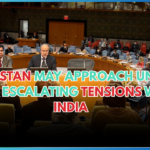In a plain and unembellished assertion, Pakistan Defence Minister Khawaja Asif has unequivocally asserted that any Indian attempt to divert or stop the water flow towards Pakistan will not be left unanswered. Addressing representatives of the media, he warned that Pakistan will have to attack the concerned infrastructure, if that is done.
His words, though caustic, are rooted in profound concern about water rights governed under the Indus Waters Treaty (IWT)—a 1960 maxim signed in a landmark World Bank-brokered deal, wherein the two countries share control of six large rivers. Pakistan has long accused India of exploiting loopholes in the treaty to construct dams and other hydroelectric schemes on the western rivers—Indus, Jhelum, and Chenab—rivers that otherwise are to be left untouched by India under the provisions of the treaty.
The Islamabad warning is not unsolicited. The recent years have witnessed a speedup of infrastructure developments on both sides of the rivers, in particular in Kashmir by India. Even though New Delhi says these are within legal parametres and not intended to cut off Pakistan’s share of waters, Pakistani authorities cannot guarantee. There are mounting fears, especially in rainfall deficit years when even modest cuts in river supplies can impact the already fragile, agriculture-based economy of Pakistan.
Khawaja Asif’s language reveals a shift from diplomatic restraint to national resolve. His words indicate that Pakistan remains amenable to peaceful solutions, but will not stand for its very basis of water rights being undermined. This is no longer an issue of policy—it’s being dealt with as a matter of national security.
There has not been any direct response from India’s foreign ministry yet. Earlier, Indian authorities have reiterated their commitment to the IWT on the basis that they are entitled to exercise their full right under the treaty. But in Islamabad, there is still skepticism—motivated by historic suspicion as well as growing fears about future shortages of water.
Observers and policy analysts are urging restraint from both sides. Water disputes, if mishandled, can escalate quickly, particularly in regions with nuclear capabilities and existing political friction. Several international voices have recommended that both governments consider setting up independent joint inspections and regular audits of river activity to rebuild trust and avoid miscommunication.
For now, the threat is valid. Pakistan’s message to India is clear: any move to capture or cut off water won’t be accepted lying down. The nation views its rivers not only as a lifeline but as a right acquired by international convention—and one it is prepared to defend with more than mere words










